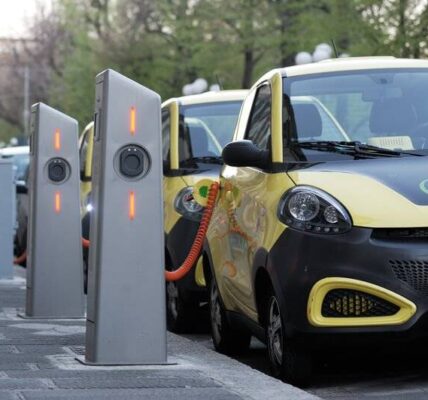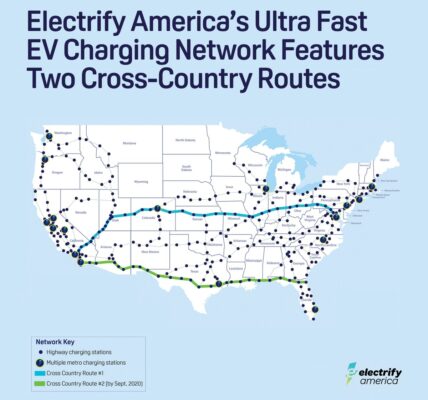Petroleum products continue to fuel most of our vehicles while fouling our air, leaving some people more vulnerable to suffering severe impacts from respiratory illnesses like COVID-19. Transportation is also the largest source of greenhouse gas emissions in the U.S., and studies show that powering cars, trucks, and buses with electricity would reduce climate pollution.
With the oil industry suffering what is probably its worst year in history, and the window of time for tackling the climate crisis narrowing, could this be the best and last chance the world has to push the accelerator on electrifying transportation.
The electrification of vehicles appears inevitable, and indeed is already underway. Government policies can help support and quicken this transition. Experts say this policy support is critical in order to meet climate targets and to help ensure the auto industry stays profitable and competitive as society decarbonizes.
“Governments have strong incentives to reduce CO2 levels, improve air quality in cities, and drive job growth,” Hertzke said. “To avoid a hard landing for the auto industry and its workers from a profitability perspective, there are many things governments can do to ease the transition to more sustainable transport. Even in response to the COVID-19 crisis there are levers to pull including vehicle scrappage programs that promote faster turnover of older vehicles with a switch to BEV [batter electric] and PHEV [plug-in hybrid electric] vehicles, ‘green stimulus’ programs that direct government funds toward charging infrastructure build out, and extension of consumer subsidies for EV purchases.”
Cash incentives, support to expand charging infrastructure, and vehicle turnover programs could be integrated into economic stimulus packages or the longer-term recovery process from the pandemic.
“Part of the economic recovery can be to create incentives within the economic stimulus to support electrification,” said Ben Prochazka, national director of the Electrification Coalition, which advocates for electrifying transportation and reducing dependence on oil. “The opportunity to reduce transportation emissions is something we should be prioritizing.”
The EV federal tax credit, Prochazka said, is a “critically important tool.” The credit for consumers who buy or lease an EV in the U.S. is up to $7,500, though it phases out when auto manufacturers sell over 200,000 qualifying electric vehicles. Tesla and General Motors have both reached this cap.
Creating the charging infrastructure necessary for electric vehicles is essential to advancing the electrification transition. At the federal level, a bipartisan transportation bill introduced last year included up to $1 billion to fund EV charging infrastructure. Another bill introduced in February by Democratic Representatives Alexandria Ocasio-Cortez and Andy Levin calls for developing a national network of electric vehicle charging stations within five years.
“Establishing a nation-wide network of electric vehicles charging stations helps us reduce emissions, creates good paying jobs, and will help transition the U.S. economy to a cleaner future,” Ocasio-Cortez said in a press release announcing the EV Freedom Act.
States, municipalities, and electric utilities are undertaking investments and initiatives to expand EV charging. According to a National Governors Association white paper, 35 states are using their Volkswagen Settlement funds’ maximum allocation (15 percent) for EV charging projects. Cities are starting to pass EV Ready ordinances, which require a percentage of residential and commercial spaces to support EV charging. And electric utilities can play a role by investing in the charging infrastructure.
Another policy proposal that would help boost EV charging, stimulate clean car manufacturing, and incentivize consumer EV purchasing is Senate Democratic Leader Chuck Schumer’s (D-NY) Clean Cars for America initiative introduced last fall. The proposal borrows from the previous Cash for Clunkers stimulus measure, providing Americans with a cash voucher to trade in an old gasoline-powered car for a qualifying electric or plug-in hybrid vehicle. It also would establish a grant program for states and localities to expand charging infrastructure as well as offer “robust incentives” for manufacturers to build or renovate factories to produce the clean vehicles.
According to a press release on the proposal, the plan would “result in 63 million fewer carbon-emitting cars” and create an estimated tens of thousands of good-paying U.S. jobs.
The incumbent fossil fuel industry presents perhaps the most substantial roadblock to making road transportation cleaner. Although there is currently an opportunity to include electric vehicle policies and other green measures in economic recovery efforts, the political allies of oil and gas interests seem unlikely to embrace these measures.
The Trump administration has used this time of crisis to dole out favors to the faltering oil companies, such as granting a request from the American Petroleum Institute to temporarily ease environmental reporting and compliance requirements, and is examining the possibilities of opening up funds or facilitating access to lending programs under coronavirus economic relief efforts.
President Trump even convened an in-person meeting with oil executives earlier this month. That meeting occurred just days after his administration released a final rule weakening clean car standards, a rollback that solely benefits the petroleum industry.
“The fossil fuel industry is trying to stop a transition to cleaner transportation at every turn, from the Koch-funded effort to halt or eliminate the EV tax credit to pushing the Trump administration to roll back fuel economy and emissions standards,” said Don Anair, research and deputy director for the Clean Vehicles Program at the Union of Concerned Scientists. “Policymakers need to make a choice, invest in the fossil fuel industries of the 20th century, or invest in the technologies and industries that will position the U.S. for growth in the global economy of the 21st century?”
Ultimately, EV advocates suggest, it is a choice between lining the pockets of oil executives, or promoting American economic leadership while protecting national security, public health, and the climate.
“Electrification of our transportation sector improves our economic security,” the Electrification Coalition’s Ben Prochazka added. “It reduces our dependence on oil, which has huge geopolitical influences. An EV is the only vehicle on the road that will get cleaner over time as our electricity sector gets cleaner … At the end of the day, EVs offer a lot more solutions than a gas car ever can.”







